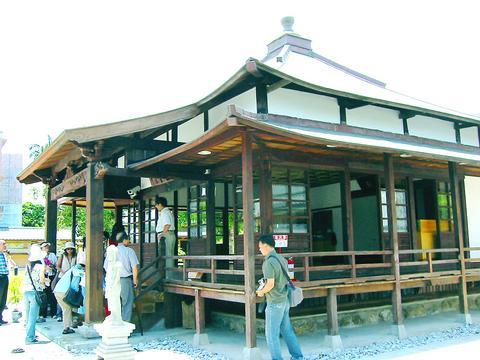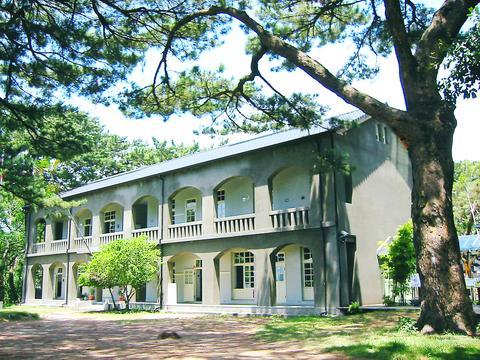With an exemplary new tour route of its abundant historical sites, Hualien County is ready to unfold its charm and spectacular scenery to visitors.
The tour is one of six routes that are being promoted by the Council for Cultural Affairs (CCA), to encourage local and foreign tourists to learn more about the nation's culture through its architectural heritage. The other tours will take visitors to sites in Jinmen County, Penghu County, Tainan, northern Taiwan and Taichung.

PHOTO: JEWEL HUANG, TAIPEI TIMES
The Council for Cultural Affairs (CCA) is marking about 500 historical sites around the country with a round logo and organizing this architecture as tourist spots in the "Tour of Taiwan's Classical Historical Buildings." The tour is a key project that the CCA started promoting this month, aiming to implement the Cultural Citizenship Campaign and the Citizens' Esthetics Movement, two policies initiated by Chen Chi-nan (

PHOTO: JEWEL HUANG, TAIPEI TIMES
"There are many historical buildings which may not be old enough to be preserved as national historic spots, but they tell us so many stories about this land," Chen said at a news conference last week announcing the debut of the tour. "They are like chapters of the history of Taiwanese culture," Chen said.
Chen said the new tours tap into the Cultural Heritage Preservation Law's (
One of the six routes on the tour will visit Hualien's old buildings, and reveal the county's complicated cultural and historical legacy left by its diverse residents over the past 300 years -- who include Aborigines, Japanese, Hakka, Hoklo and Mainlanders.
"In addition to its famous Taroko National Park, Hualien is a wonderland of diverse cultures and ethnic groups," said Ruan Chang-rui (
The CCA has launched a website for people who are interested in the tour, at http://hbtravel.cca.gov.tw. The council especially recommends the following historical sites to tourists who want to get acquainted -- or re-acquainted -- with Hualien.
Pine Garden
Built in 1943, Hualien City's Pine Garden used to be the military base for the Japanese Navy stationed there during World War II. Soon it became a recreational resort for high-ranking Japanese officers. It was said that the Pine Garden was the place where kamikaze pilots would drink the wine bestowed by the Japanese emperor on the eve of their suicide missions, according to the manager of Pine Garden, Lin Cheng-tsung (
With nearly 200 pines, the tranquil garden faces the estuary of the Meilun River to the Pacific Ocean. After being restored by the Hualien County government, the garden was officially recognized as one of Taiwan's "top 100 historic charms" in 2001. It features afternoon tea for tourists.
Ching-shiu Temple
Built in Jian in 1917 by Japanese immigrants, Ching-shiu Temple is the only Japanese temple that is completely preserved in Taiwan. Chian township (
There are 88 stone Buddhas moved from the same number of temples in Shikoku, according to Huang Jung-tun (
Tobacco-roasting Houses
About 35 old tobacco-roasting houses in Fenglin recall the once-booming tobacco industry, which began during the period of Japanese rule.
However, although realizing the historical value of the tobacco-roasting houses, the Hualien city government has not yet restored these old buildings because of insufficient funds in their budget.
Old house of Fataan Tribe
Built in Kuangfu between 1924 to 1929 by Bawon Buting, a chieftain of Fataan Tribe, an Amis tribe in Hualien County.
The old tribe house reveals the matriarchal tradition of the Amis tribes.
The house was divided by the daughters of Bawon Buting, and most of the utensils used since as far back as the 1930s have been well preserved.

A magnitude 4.9 earthquake struck off Tainan at 11:47am today, the Central Weather Administration (CWA) said. The hypocenter was 32.3km northeast of Tainan City Hall at a depth of 7.3km, CWA data showed. The intensity of the quake, which gauges the actual effect of a seismic event, measured 4 in Tainan and Chiayi County on Taiwan's seven-tier intensity scale, the data showed. The quake had an intensity of 3 in Chiayi City and County, and Yunlin County, while it was measured as 2 in Kaohsiung, Nantou County, Changhua County, Taitung County and offshore Penghu County, the data showed. There were no immediate reports of

‘DENIAL DEFENSE’: The US would increase its military presence with uncrewed ships, and submarines, while boosting defense in the Indo-Pacific, a Pete Hegseth memo said The US is reorienting its military strategy to focus primarily on deterring a potential Chinese invasion of Taiwan, a memo signed by US Secretary of Defense Pete Hegseth showed. The memo also called on Taiwan to increase its defense spending. The document, known as the “Interim National Defense Strategic Guidance,” was distributed this month and detailed the national defense plans of US President Donald Trump’s administration, an article in the Washington Post said on Saturday. It outlines how the US can prepare for a potential war with China and defend itself from threats in the “near abroad,” including Greenland and the Panama

The Chinese Nationalist Party (KMT) is maintaining close ties with Beijing, the Democratic Progressive Party (DPP) said yesterday, hours after a new round of Chinese military drills in the Taiwan Strait began. Political parties in a democracy have a responsibility to be loyal to the nation and defend its sovereignty, DPP spokesman Justin Wu (吳崢) told a news conference in Taipei. His comments came hours after Beijing announced via Chinese state media that the Chinese People’s Liberation Army’s Eastern Theater Command was holding large-scale drills simulating a multi-pronged attack on Taiwan. Contrary to the KMT’s claims that it is staunchly anti-communist, KMT Deputy

RESPONSE: The government would investigate incidents of Taiwanese entertainers in China promoting CCP propaganda online in contravention of the law, the source said Taiwanese entertainers living in China who are found to have contravened cross-strait regulations or collaborated with the Chinese Communist Party (CCP) could be subject to fines, a source said on Sunday. Several Taiwanese entertainers have posted on the social media platform Sina Weibo saying that Taiwan “must be returned” to China, and sharing news articles from Chinese state media. In response, the Mainland Affairs Council (MAC) has asked the Ministry of Culture to investigate whether the entertainers had contravened any laws, and asked for them to be questioned upon their return to Taiwan, an official familiar with the matter said. To curb repeated